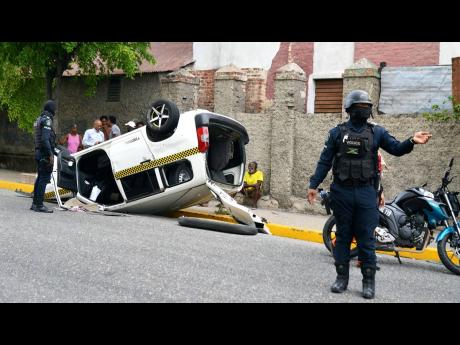Crash victim fears taking public transportation
Wendy Young* is still fearful every time she is required to take a route taxi in Kingston, seven years after she was seriously injured in a road crash.
In 2016, the St. Elizabeth native took a cab along Molynes Road while heading to work when the taxi driver overtook a line of traffic. What happened next would ensure that Young would be left with broken limbs and a fear of travelling in taxis anywhere in Kingston.
“In June 2016, I took a taxi to work because it was getting late, and I was at the bus stop for a while. While driving, he decided to overtake a line of traffic, and out of the blue, I saw a van filled with Transport Authority and police personnel,” she recalled.
Young said the driver stopped as the Transport Authority vehicle blocked his path.
“I thought he was going to tell us to get out and speed off. However, what he did was make a sharp turn on the road and start driving fast. The Transport Authority vehicle started chasing the taxi, and he started driving through several residential communities and on the opposite side of the road on the busier thoroughfares,” she continued.
Young said she and other passengers in the vehicle pleaded with the driver to surrender or let them out, but he ignored their pleas. “He kept on saying that he could not take another ticket and that his vehicle would be seized. In the end, he collided with a car travelling in the opposite direction near Constant Spring Road,” she related.
“I remember the transport people stopping briefly and then driving away as people came by to assist us. I remember my left arm and leg were broken. I was taken to the hospital where I spent two weeks because of the fracture of my arm,” she added.
Young said for months after the crash she blamed herself for the crash and would wake up at night trembling. “Pain aside, from that time until I got my own vehicle, I became paranoid and would tremble every time I thought about taking a route taxi. If I couldn’t call a cab or have someone take me where I was going, I would stay where I was until someone came for me,” she stated.
Young said she hasn’t received therapy and even seven years later is afraid to talk about the incident.
“It is still hard to talk about the crash, but I have tried to move on from it. I guess I will in time,” she said.
Clinical psychologist Dr Paul Smith said many persons involved in road crashes often experience post-traumatic stress disorder, or PTSD, which is a mental health condition that is triggered by a terrifying event — either experiencing it or witnessing it. Symptoms may include flashbacks, nightmares, and severe anxiety, as well as uncontrollable thoughts about the event.
“Most persons involved in road crashes experience some form of PTSD with the symptoms lasting for months, or even years, and interfere with their day-to-day functioning. Some are afraid to drive or take public transport. Others are afraid to pass the road where the crash happened. They can also refuse to talk about the crash or even develop some withdrawal from the first responders when they see them,” he said. “In Jamaica, facilities exist for treating PTSD, but some people opt to treat themselves although it isn’t safe because the symptoms associated with PTSD can worsen with time.”
“With some 367 persons losing their lives on our roads, it is important that we use our roads responsibly. Road fatalities and injuries take a toll on their family members in terms of the cost and the trauma of dealing with the situation. Road crashes affect everyone and, therefore, I urge all Jamaicans to exercise caution when using our roads,” he said.
Dr Smith adds that persons who are involved in road crashes should not hesitate to seek help. “There is no time limit on when PTSD can be treated and most persons return to a normal life after treatment. However, I encourage anyone who has been involved in a road crash and experiencing any form of PTSD to get treatment because living with this condition can impact how you deal with those around you and your everyday situation,” he said.


